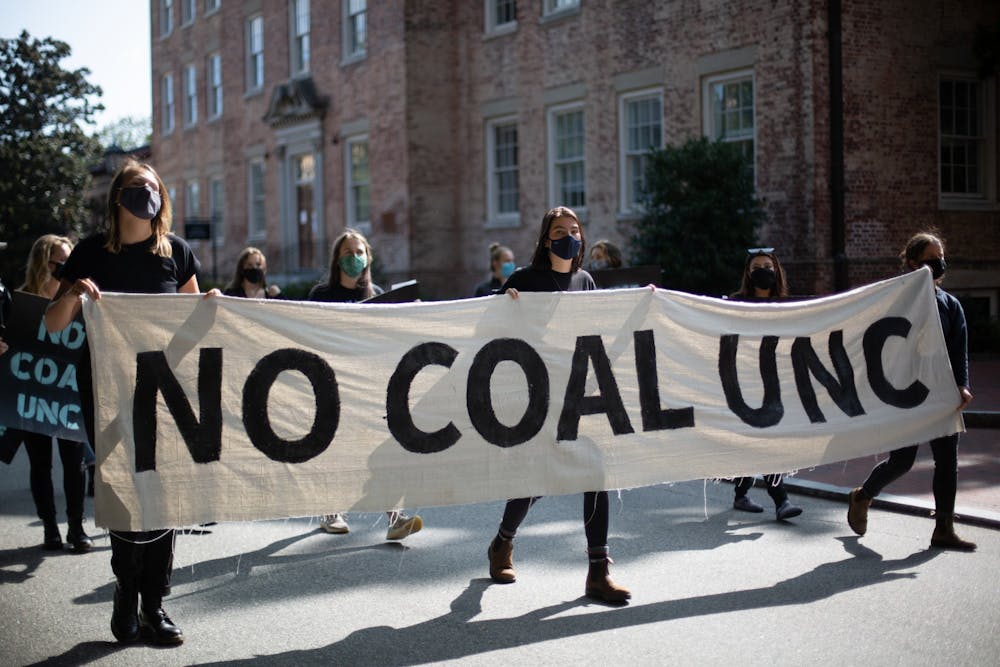One of Flanagan’s key motivations to start the club was to look at the University through a critical lens and hold it accountable for its actions, she said.
“This is supposed to be an institution of social progression, yet they are directly funding the climate crisis, and I think it's really important to hold your institution accountable,” Flanagan said.
Junior Owen Ryerson said he joined UNC Reinvest because he believes divestment and reinvestment are the most impactful avenues of student environmental organizing that can be done on campus now.
“UNC's investment in fossil fuels is having such a detrimental impact on our environment, on environmental justice and on our future,” Ryerson said. “By divesting, UNC has the opportunity to take a stand and show that it is willing to prioritize the values that it espouses and prioritize standing up for future generations, the lives of its students and the lives of the community members which it represents.”
Investments for UNC-Chapel Hill and the UNC System are managed by the UNC Management Company. In September 2014, the Board of Trustees passed a resolution requesting the Management Company research targeted investments for the University’s endowment assets that advance environmentally friendly, clean energy strategies.
“At the Management Company, we believe that supporting the development of alternative energy sources is the most effective and pragmatic way to assist in the important effort to reduce reliance on coal and other fossil fuel-based energy sources,” the Management Company said in its most recent report.
Mike Piehler, UNC's chief sustainability officer, said in a statement that the University is committed to greenhouse gas neutrality and is actively pursuing its energy transition, including ending the use of coal. He did not provide a specific timeline.
“The recently established Carolina Sustainability Council has engaged the students, faculty and staff to shape and pursue a broad sustainability agenda which includes greenhouse gas neutrality as a core goal,” Piehler said in the statement.
UNC Reinvest took part in a No Coal UNC rally on Sept. 22 that was organized by the Center for Biological Diversity and the Sierra Club. The rally, held both in person and via Zoom, called for UNC to end the use of its coal-fired power plant by 2023.
Duncan said participating in the rally was a good way for the club to start off the school year and build momentum.
“Even though we're all in this really weird time with COVID-19, there is hope that you can still have some meaningful organizing,” Duncan said.
The COVID-19 pandemic has put a damper on UNC Reinvest’s plans for the semester, Flanagan said. Instead of holding any in-person events or meetings, she said the club has focused on educating students and the community about UNC’s fossil fuel investments, as well as trying to increase transparency about the University’s investments.
To get the day's news and headlines in your inbox each morning, sign up for our email newsletters.
“We're trying to connect with other environmental orgs and social justice orgs as well, because it's very, very important to highlight that environmentalism is social justice,” Flanagan said. “We're just trying to network, connect, get the word out.”
Although COVID-19 makes UNC Reinvest’s future unsure, Duncan and Flanagan said next semester they plan to get the administration’s attention and perhaps hold some safe, in-person, direct actions.
Currently, Duncan said the club has had several general body meetings online and has also been working on community building through Zoom parties and game nights.
“One of the core aspects of organizing is building connections with the people who you're working with,” Duncan said. “If we have these little events every now then it's just a nice way to kind of relax from everything going on this semester, and also just get to know each other really well so that we can feel more comfortable with each other when we do our organizing.”
university@dailytarheel.com




